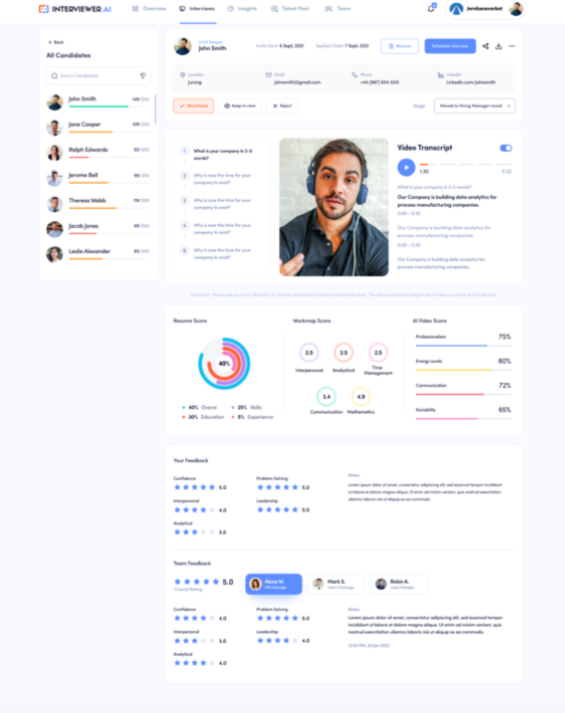The job marketplace is at a massive crossroads yet to be seen before in the modern career world. Between phenomena like the Great Resignation, the escalation of technological capacities, and the quickly morphing format of the way we report for duty—some quick adaptation is being required by both employers and employees alike.
In May 2021, a Mercer study found that 70% of companies said they were planning to adopt the hybrid work model, and according to Microsoft’s Work Trend Index, which was published three months earlier in March 2021, it was found that 66% of employers around the world are redesigning their workplaces to accommodate hybrid work arrangements. Employees agree with these changes, with a whopping 97% of employees desiring some form of remote work, according to a Flexjobs survey.
Caught in the middle of this are staffing agencies and recruitment departments, who are attempting to keep pace with both sides’ new demands and expectations. Starting off on the right foot is always a good idea for those in hiring, ‘Great Resignation’ phenomena or not, because accurate hiring leads to longevity in retention. Hiring across regions and without adequate hiring teams can be a daunting task, however, and because of the rapid adoption of change, many companies are not equipped with the tools they need to execute recruitment accurately and efficiently.
This showcases a need to utilize new technological capacities so that recruitment agencies and departments have a lifeline to this brave new world of staffing. Let’s take a look at some of the most critical ways that Artificial Intelligence (AI) is assisting talent acquisition so that it can evolve to the times.
First Thing is First: Sourcing Candidates
According to Deloitte’s Global Human Capital Trends Survey in 2019, it was found that 61% of those surveyed in the staffing industry said that recruitment’s biggest challenge is finding qualified and experienced hires. With so many different aspects factoring into the modern hiring process—from hard skills to soft skills, to years of experience, special qualifications, reliable references, etc.—weighing candidates has become a nearly impossible numbers game, especially considering every business and industry is different. This is where AI can come in and run the numbers for you.
It was found that 36% of recruiters believe AI makes their jobs better, finding it to be most helpful with sourcing candidates (58%), screening candidates (56%), and nurturing candidates (55%). With AI in their corner, recruiters can increase their scope in hiring people across the world—and with no geographic boundaries, there are no parameters to the talent that can be sourced either.
Some of the most noteworthy functions being seen in AI for sourcing and screening candidates is: Resume scoring based on predetermined benchmarks set out by individual companies, mapping skill assessments to help group candidates by areas of expertise, and finally video responses based on scientifically-proven structured interview techniques.

One company, Interviewer.AI, takes hiring software to another level—becoming a recruitment partner for businesses and helping to instantly match them with the top available applicants. With strategic data integrated into its platform to guide decision-making, companies can remove the mundane tasks that often come with pre-screening procedures, assessing and evaluating each applicants’ skills and motivations for applying, all within a span of ten minutes. This ultimately helps candidates better fit into roles, and employers better understand who they need to fill them.
Company Transparency
It is important to create a two-way channel of communication in your employment strategy that highlights transparency and honesty. This digital reality also affects the applicants, who can no longer absorb their surroundings in waiting rooms while they go through a hiring process or from face-to-face interactions in interviews, and now must glean whether they are a good fit from a virtual experience.
Companies should do their best to translate their core principles right from the get-go, starting with the job description. Space committed to how the team functions, the values and traits that embody their culture, and some insight into industry expectations is also important—and AI can help in this department. If integrated strategically, this highly intelligent technology can help to build a brand for recruitment firms and departments, making this critical part of acquisition not only approachable but easy as well.
Insight-driven businesses are growing at an average of 30% each year; and are predicted to take $1.8 trillion annually from their less-informed industry competitors. Allowing AI to be your company’s hiring assistant by giving it the data to help you build your brand is vital. What is more, it can help with the timeliness of a company’s hiring. As many in staffing know, hiring needs are spread across the year, and building a talent pipeline can make all of the difference.
According to the 2020 Job Seeker Nation Survey, it was found that AI helps deliver a positive candidate experience, which has become the expected norm for the majority of applicants—and so, a new, higher bar has been set.

Employee Fitness
It was found that 80% of executives believe AI can improve productivity and performance. Again, this is a matter of allowing AI to have the data it needs to draw out the information to help generate these metrics in employee fitness—but, it is important to note that this can be done with privacy and compliance regulations top-of-mind as well.
One example of how companies can digitally implement this is through the “Digital Fitness” app where employees share which types of training they believe they can benefit from. By investing in development for current talent, companies demonstrate a business’s commitment to its employees. This can by proxy attract future candidates, but can also inform employers of important factors such as where the company can improve, or where entire-company development might be needed—a win, win, win all around.
If companies then allow AI to take this personal workplace data and run with it, the possibilities are endless. One bright example is AI conversational chatbot assistants that are being used to help employees with their daily duties—reminding them of tasks on their to-do list, of upcoming meetings, or maybe even of time needed to commit to training.
Whether a company is employing AI in hiring new candidates or reinvesting in their already existing employees, as it was shown that internal hiring has 41% longer employee tenure—with technological insight a business can ensure the best endurance for the people within their organization.
AI to Be The Game-Changer in Talent Acquisition
No matter which way you flip it, AI will be an essential tool for the future of staffing. It will help companies optimize the prerequisites of hiring, accurately project themselves into the current tumultuous job market, and finally support endurance for current employees. This will help to bring peace of mind back to the recruitment process for staffers and help companies across industries to stay ahead of the curve. Learn more about how staffing agencies can benefit from AI-based platforms here.
Disclaimer: This article mentions a client of an Espacio portfolio company.












